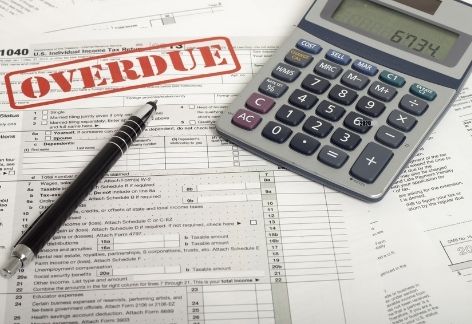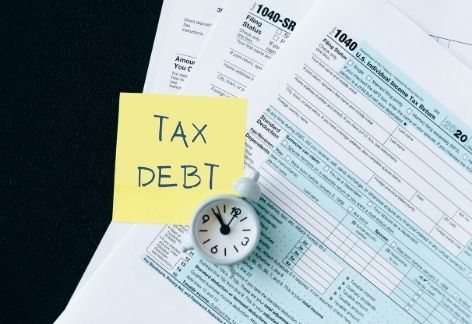If you owe back taxes, you might wonder: Can the IRS take money out of your bank account? The short answer is yes.
When the IRS determines a taxpayer has outstanding debt, they have the authority to issue a bank levy. This allows them to withdraw funds directly from an account.
This action is one of the most aggressive collection methods the IRS uses, and it can leave individuals and businesses struggling to cover basic expenses.
How Does the IRS Seize Funds from Your Bank Account?
Many taxpayers feel caught off guard when they discover their accounts are frozen. However, the IRS cannot seize funds without first sending official correspondence. These notices provide an opportunity to challenge the IRS bank levy, set up a payment plan, or get professional tax relief assistance.
Ignoring these warnings can lead to serious financial hardship because the IRS will proceed with collection efforts until the full tax debt is satisfied.
Even though the IRS must send notices before taking action, many people overlook or misplace these warnings, assuming they are unimportant. Unfortunately, once the levy is enforced, it becomes much harder to stop.
Knowing IRS procedures and responding promptly is the best way to prevent an account from being frozen. If a taxpayer receives a Final Notice of Intent to Levy, immediate action is needed to protect their financial well-being.
Can the IRS Take Money Out of Your Savings Account?
Yes, the IRS can levy funds from both checking and savings accounts. No account type is exempt. If there are enough funds in a savings account, the IRS can seize whatever amount is necessary to cover the outstanding balance.
This can be upsetting, especially for those who rely on savings to cover emergencies, tuition, or retirement. Once the levy is in place, stopping it requires immediate action.
Many taxpayers assume that keeping funds in a savings account protects them from collection efforts, but this is not the case. The IRS treats savings accounts the same as checking accounts, meaning they have the authority to seize funds from either source.
Those facing tax debt should not wait until a levy is enforced. Proactive steps, such as negotiating a payment plan, can prevent the loss of hard-earned savings.
How Long Does It Take for the IRS to Seize Funds?
Once the bank receives the levy notice, they must freeze the account immediately. However, they usually hold the funds for 21 days before transferring them to the IRS. This period allows taxpayers time to dispute the levy or negotiate a resolution.
If no action is taken, the bank processes the payment, and the IRS applies the funds to the outstanding debt.
The 21-day holding period is an important window for taxpayers to search for relief. During this time, a tax professional can help file appeals, request a levy release, or establish a payment arrangement.
Waiting until the last minute increases the likelihood that the IRS will take the funds, leaving taxpayers with fewer options to recover their money.
How to Stop an IRS Bank Levy Before It’s Too Late
There are several ways to prevent or remove a bank levy. The first step is responding to IRS notices as soon as they arrive. Taxpayers can set up an Installment Agreement, which allows them to pay the debt over time rather than face immediate collection.
Another option is Currently Not Collectible (CNC) status, which temporarily halts IRS collection efforts if the taxpayer can prove financial hardship. In some cases, an Offer in Compromise (OIC) can reduce the total tax burden if the IRS determines that full payment would create an undue financial strain.
It is necessary to act quickly. The IRS does not hesitate to enforce levies, and once funds are removed, recovering them is difficult. A tax relief professional can analyze a taxpayer’s financial situation and determine the best course of action to halt collection efforts before they worsen.
What to Do If the IRS Has Already Seized Funds
If money has already been removed from an account, there may still be options for recovery. Taxpayers can request a levy release if the seizure causes serious financial hardship.
This process requires submitting documentation that demonstrates an inability to pay for necessities like rent, utilities, or medical expenses. Legal representation can improve the chances of a successful appeal.
In some cases, taxpayers may qualify for a partial refund of seized funds if they can prove financial hardship. However, the process can be complex and requires detailed financial records. Assistance from a tax relief professional increases the likelihood of a more favorable outcome.
Can the IRS Levy Joint Bank Accounts?
The IRS has the authority to levy joint bank accounts, even if only one account holder owes taxes. If a spouse or business partner is not responsible for the debt, they may be able to contest the levy by proving that their portion of the funds does not belong to the debtor. In situations involving joint accounts and IRS levies, it's essential to understand the rights and responsibilities of each account holder. They should keep clear records of contributions to the account to provide evidence if a dispute arises. Seeking legal advice can also be beneficial to navigate the complexities of tax levies effectively.
However, the burden of proof falls on the non-debtor, requiring bank statements and financial records to support their claim.
Joint account holders who are not responsible for the tax debt should act quickly to dispute the levy. Providing documentation that shows separate ownership of funds can help prevent the IRS from seizing money that does not belong to the debtor.
How a Tax Relief Professional Can Help
Handling IRS levies without expert guidance can be mind-numbing. Tax relief professionals know IRS procedures and can negotiate directly with the agency. They help clients file appeals, submit financial hardship claims, and explore settlement options.
Having legal representation can prevent aggressive collection tactics and create a manageable resolution plan.
The IRS is not known for leniency, and taxpayers who attempt to handle levies on their own often struggle to achieve a favorable resolution. A tax relief expert can assess the situation, identify possible solutions, and negotiate with the IRS to protect assets and income from further collection efforts.
What Happens If You Ignore an IRS Levy?
Failing to respond to an IRS levy can lead to further consequences. If the funds seized do not cover the full tax debt, the IRS can continue collection efforts. This includes placing additional levies on bank accounts, garnishing wages, or even seizing property.
In extreme cases, the IRS can escalate enforcement measures, making it even more difficult to regain financial stability.
Ignoring a levy does not make the problem go away. Instead, it allows the IRS to take even more assertive action. The best way to prevent escalating consequences is to take immediate steps to resolve the tax debt before further collection measures are enforced.
Can the IRS Levy a Business Bank Account?
Business owners are not exempt from IRS levies. If a company owes payroll taxes or other outstanding tax debts, the IRS can seize business funds just as they would with an individual’s account. This can disrupt operations, making it difficult to pay employees, vendors, or overhead expenses.
Getting immediate tax preparation and planning assistance is the best way to minimize business disruptions.
How Rush Tax Resolution Can Help
Rush Tax Resolution knows how terrifying it is to find your bank accounts frozen. The IRS does not wait, and neither do we. Our tax professionals take immediate action to challenge levies, stop seizures, and negotiate favorable resolutions.
Unlike other firms, we offer a FREE IRS transcript investigation to uncover exactly what the IRS has on file. This valuable service helps us determine the best strategy for your situation without charging you.
Other firms charge up to $1,500 for this. We charge nothing. If you are facing a bank levy, time is not on your side. Call us now, and we will fight to protect your money.
We do not take on cases unless we know we can help. If the IRS is threatening to seize your assets, you need a team to fight back. Our licensed tax attorneys specialize in stopping bank levies, wage garnishments, and other aggressive IRS actions.
Do not face the IRS alone. Reach out today and get the expert tax relief assistance you deserve. Contact us now for a free consultation to get started immediately.











